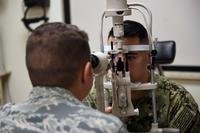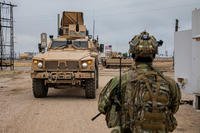As House Republicans prepared to close down a large part of the government in their latest attempt to gut the 2010 Affordable Care Act, one of their own introduced the Pay Our Military Act (HR 3210) to allow military members to be paid through the shutdown.
Congress quickly passed the bill from Rep. Mike Coffman (Colo.), a Marine Corps Reserve retiree, and President Obama signed it into law. So military pay continues even as 400,000 defense civilian employees go on unpaid furlough.
The shutdown is stinging military communities in other ways, and the hurt is enhanced by the tough budget choices Defense officials must make entering a second year of sequestration. The temporary closing of 175 stateside commissaries is a prime example.
"Commissary patrons across the United States reacted to the announced store closures in the same manner as customers descend on a grocery store to prepare for a hurricane," said the Defense Commissary Agency in responding to our question about store traffic that last day.
Commissary sales Oct. 1, the day before base grocery stores were shuttered, totaled $30.6 million, or more than double normal sales. About 85 percent of those dollars were spent in stores now closed.
"Those numbers underscore the impact of the closure on commissary patrons, who demonstrated with their transactions on Oct. 1 that they depend on their commissary benefit," the agency said.
Commissaries overseas remain open, as do all military exchanges, or base department stores, which are self-funded.
When Republicans last shut down the government, for a few days in 1995 and several weeks in 1996, Defense officials allowed all base grocery stores to operate normally. Why not this time?
"In each decision to keep commissaries open or closed, the Department of Defense based its rulings on the budget environment at the time," the agency responded.
Closing all stateside commissaries, except for two in remote areas of California and one in Alaska, disappointed patrons but it has stunned food manufacturers, distributors and brokers who supply the goods. Their representatives are upset and urging the administration to reverse course.
"This is uncharted territory for commissaries," Patrick B. Nixon, president of American Logistics Association, and Thomas T. Gordy, president of Armed Forces Marketing Council, told Deputy Defense Secretary Ash Carter in a joint letter signed Tuesday.
They noted how commissaries stayed open through past shutdowns and how suppliers expected this policy to be repeated. Nixon and Gordy warned of "pressure on in-store inventory and the working capital funds as products begin to spoil and reach their expiration dates." They predicted "precipitous disruption of the supply chain," creating "difficult issues" for distributors and brokers over inventory ownership in the pipeline and "a host of logistical, administrative and legal matters as products expire" and costs climb into the "hundreds of millions of dollars."
It's unclear what authority Defense officials used in past shutdowns to keep commissaries open. But Nixon and Gordy said the new Pay Our Military Act would allow the department to bestow "excepted status" on commissary employees. Specifically the law says pay can be provided "to civilian personnel of the Department of Defense whom the Secretary concerned determines are providing support to members of the armed forces."
Yet 11,000 commissary employees are now furloughed, many of them military family members and retirees.
Joyce Wessel Raezer, executive director of the National Military Family Association, said she too was surprised to see stateside commissaries closed.
"Reports from several of our volunteers who ventured out said the commissaries were a mad house" that last day. "Basically the crowds accomplished what DECA wanted; it got rid of perishables…If people build into their family financial plan getting groceries for a certain cost at the commissary, versus going downtown, they are going to stock up as much as they can" to capture savings before stores close, Raezer said
Her organizations is more concerned with the shutdown's effect on access to base healthcare and family support services. Levels of staffing for these activities are being determined by individual commands, she said.
"We are hearing from our volunteers at local installations on what's open, what's closed. But the quality of information varies tremendously. And it's going to get worse because, in most cases, people responsible for updating the DoD and service websites are now furloughed," Raezer said
Schools and Child Development Centers on base are open. But childcare for school-age children before school and after might not be available if located away from development centers. Many young military families who rely on Women, Infant and Children (WIC) nutritional assistance could see that program running out of money if the shutdown drags on.
"So not only are we making families pay more at the grocery store, our young, vulnerable families with babies and little kids are going to lose the extra nutritional support," Raezer said.
Furloughs will impact access to care in base hospitals and clinics but the Defense Health Agency can't predict how yet. DHA does vow that the shutdown will not impact inpatient care, acute care or emergency care on base, nor will it affect access to private sector care under TRICARE options.
Though activated Guard and Reserve personnel will be paid, reserve component drills are being cancelled so drill pay will stop. Death gratuities to survivors of members killed on active duty will be delayed. Education centers on bases are closed and tuition assistance is unavailable.
Promotion boards are suspended. Training and travel are disrupted unless connected to the war in Afghanistan, readiness for future deployments or other "excepted activities" including emergency services, police, firefighters and emergency medical personnel.
Military families with questions about the shutdown's effects can visit or call Military One Source or 800-342-9647), which is one activity being kept fully staffed during the shutdown.
To comment, write Military Update, P.O. Box 231111, Centreville, VA, or email milupdate@aol.com or twitter: Tom Philpott @Military_Update









